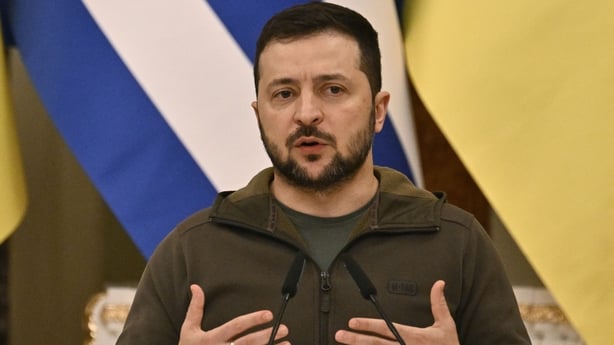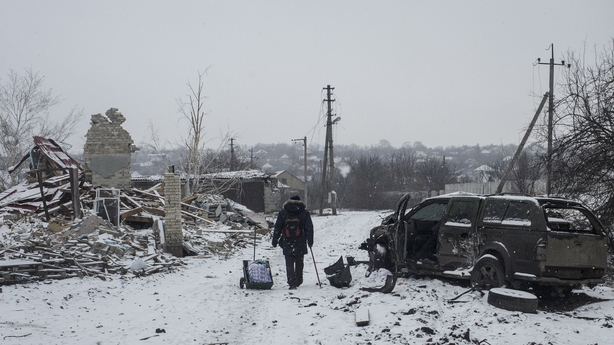Ukrainian authorities have raided an influential billionaire's home in what an ally of President Volodymyr Zelensky touted as a sweeping wartime clampdown on corruption that would change the country.
Separate raids were carried out at the tax office and on the home of an influential former interior minister, two days before Kyiv hosts a summit with the European Union at which it wants to show it is cracking down after years of chronic corruption.
Ukraine sees Friday's summit as key to its hopes of one day joining the bloc, a goal that has grown more urgent following Russia's invasion, and has also embarked on a political shake-up in which over a dozen officials quit or were sacked last week.
Security officials searched the home of businessman Ihor Kolomoiskiy, one of Ukraine's richest men and a one-time ally of Mr Zelensky, in what several media outlets said was an investigation into possible financial crimes.
Mr Kolomoiskiy could not immediately be reached for comment. He has previously denied any wrongdoing.
The Security Service of Ukraine (SBU) later said it had uncovered a scheme to embezzle more than $1 billion at oil producer Ukrnafta and oil refining company Ukrtatnafta, companies that Mr Kolomoiskiy used to partly own.
Photographs circulating on social media appeared to show Mr Kolomoiskiy, dressed in a sweatsuit, looking on in the presence of at least one SBU officer inside a large wooden home. Reuters could not immediately verify the authenticity of the images.
In a statement that did not name Mr Kolomoiskiy, the SBU published the same photographs, but with the person's face blurred out.
David Arakhamia, a senior member of Mr Zelensky's Servant of the People party, confirmed the search of Mr Kolomoiskiy's home as well as the separate raids conducted at the Tax Office and at the home of Arsen Avakov, a former interior minister.
Mr Arakhamia said the entire management of the customs service was set to be dismissed and that high-ranking defence ministry officials had been served with notices informing them they were suspects in a case. He gave no details.
"The country will change during the war. If someone is not ready for change, then the state itself will come and help them change," Mr Arakhamia wrote on the Telegram messaging app.
In a statement, the Prosecutor General's Office later said "corruption in a time of war is looting" and said four senior current and former officials had been served "notices of suspicion", along with the senior management of Ukrtatnafta.
The head of the State Bureau of Investigation said the law enforcement action was "only the beginning".
Ukraine's long-running battle against corruption has taken on vital significance, as Russia's invasion has made Kyiv heavily reliant on Western support and it needs to carry out reforms to join the 27-nation EU.
Domestic politics has largely been frozen as politicians focus on fighting Russia, but Mr Zelensky presided over the first major political shake-up of the war last week after an outcry over a corruption scandal involving an army food contract.
Mr Zelensky said yesterday that more personnel decisions were in the pipeline and promised reforms that would change Ukraine's "social, legal and political reality".
He was elected president in 2019 on an anti-corruption ticket and launched a crackdown on wealthy businessmen known as "oligarchs" in late 2021. The oligarchs took control of swathes of industry during the post-Soviet privatisations of the 1990s and wield influence to this day.
The Ukrainska Pravda media outlet said the search on Mr Kolomoiskiy's property related to an investigation into the alleged embezzlement of oil products and evasion of customs duties.
Separately, Mr Avakov said his home was searched as part of an investigation into a helicopter crash on 18 January that killed 14 people including Interior Minister Denys Monastyrskyi.
He said investigators were looking into the purchase six years ago of a model of Airbus helicopter that was involved in the crash, but that "nothing relevant to the interest of the investigation was found".
The prosecutor general's office said the top management of Ukrtatnafta had been notified it was under suspicion, as were a former energy minister, a former deputy defence minister and other officials.
Mr Kolomoiskiy, who faces a fraud case in the United States, has been at the centre of corruption allegations and court disputes for years that Western donors have said must be resolved for Kyiv to win aid.

In an address overnight before the raids, Mr Zelensky alluded to new anti-corruption measures in time for Friday's summit.
"We are preparing new reforms in Ukraine. Reforms that will change the social, legal and political reality in many ways, making it more human, transparent and effective," he said, promising to reveal the details soon.
Longer range missiles
Ukrainian forces that recaptured swathes of territory from Russian troops in the second half of 2022 have seen their advance stall since November. Kyiv says the key to regaining the initiative is securing advanced Western weaponry.
Two US officials said a new $2 billion (€1.83 million) package of military aid to be announced as soon as this week would for the first time include Ground Launched Small Diameter Bombs (GLSDB), a new weapon designed by Boeing.
The cheap gliding missiles can strike targets more than 150km away, a dramatic increase over the 80km range of the rockets fired by HIMARS systems, which changed the face of the war when Washington sent them last summer.
That would put all of the Russian-occupied territory on Ukraine's mainland, as well as parts of the Crimea peninsula seized by Moscow in 2014, within range of Kyiv's forces.
Kremlin spokesman Dmitry Peskov said the arrival of longer range US weapons would escalate the conflict.
Western countries pledged scores of advanced main battle tanks for the first time last week, a breakthrough in support aimed at giving Kyiv the capability to recapture occupied territory this year.
But the arrival of the new weapons is still months away, and in the meantime, Russia has gained momentum on the battlefield, announcing advances north and south of the city of Bakhmut, its main target for months.

Kyiv disputes many of those claims and Reuters could not independently verify the full situation, but the locations of reported fighting clearly indicate incremental Russian advances.
Troops were fighting building to building in Bakhmut for gains of barely 100m a night, and the city was coming under constant Russian shelling, a soldier in a Ukrainian unit of Belarusian volunteers told Reuters from inside the city.
Ukraine's general staff said late yesterday its forces had come under fire in Bakhmut and the villages of Klishchiivka and Kurdyumivka on its southern approaches.
South of Bakhmut, Russia has also launched a major new offensive this week on Vuhledar, a longstanding Ukrainian-held bastion at the junction of the southern and eastern front lines. Kyiv says its forces have so far held there.
The infusion of Western military and financial aid creates new pressure on Mr Zelensky to demonstrate his government can clean up Ukraine.
Last week, he purged more than a dozen senior officials following a series of scandals and graft allegations in the biggest shakeup of Ukraine's leadership since the invasion.
Following today's raids, the parliamentary leader of Mr Zelensky's Servant of the People party, David Arakhamia, wrote on Telegram: "The country will change during the war. If someone is not ready for change, then the state itself will come and help them change."

